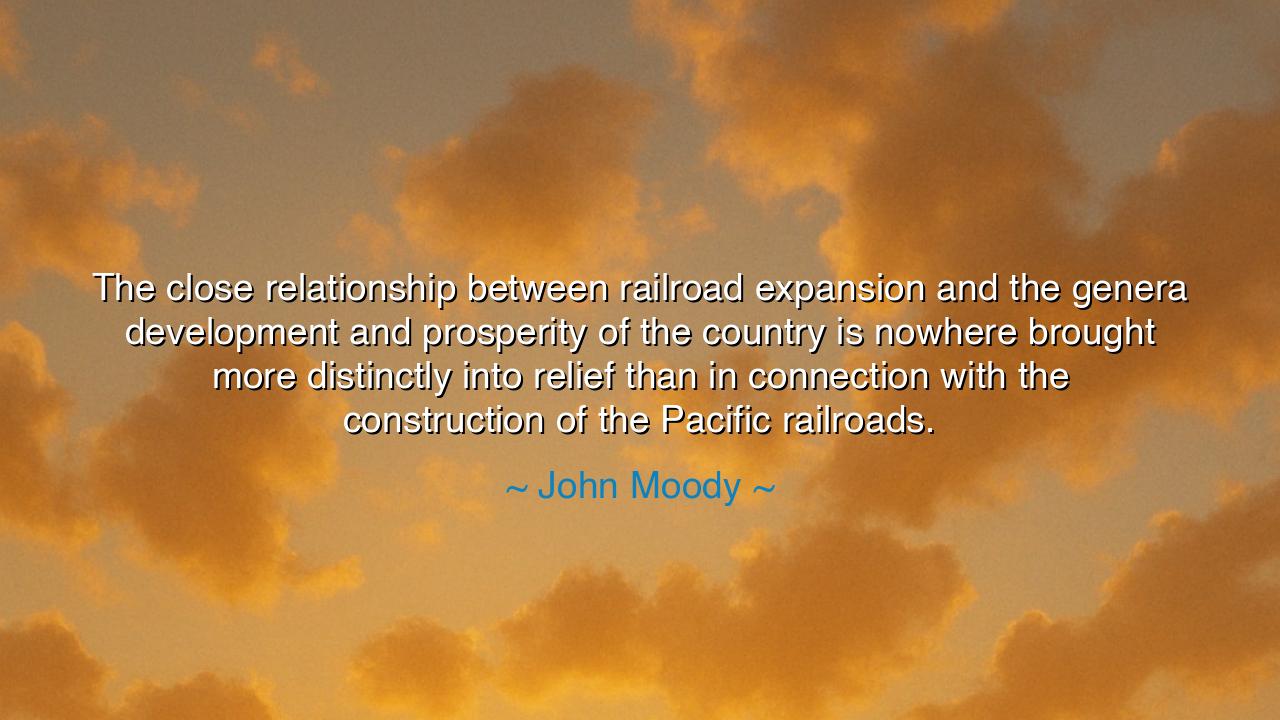
The close relationship between railroad expansion and the genera
The close relationship between railroad expansion and the genera development and prosperity of the country is nowhere brought more distinctly into relief than in connection with the construction of the Pacific railroads.






When John Moody declares, “The close relationship between railroad expansion and the general development and prosperity of the country is nowhere brought more distinctly into relief than in connection with the construction of the Pacific railroads,” he speaks with the vision of one who perceives the lifeblood of nations. His words remind us that great works of infrastructure are not merely of iron and wood, but of destiny itself, binding together the fates of people, commerce, and progress.
The origin of this wisdom lies in the history of the 19th century, when the Pacific railroads were laid across the vast and untamed lands of America. To Moody, a financial analyst and chronicler of industry, this was not only an engineering marvel but a turning point in the nation’s development. The railroad expansion opened new horizons, joining east to west, and carrying with it the seeds of trade, migration, and unity.
To name the relationship between railroads and prosperity is to uncover the truth that no nation rises without paths of connection. The steel lines became arteries through which flowed not only goods but also ideas, cultures, and dreams. Without such a network, growth would have been stunted; with it, the nation’s vigor surged. In this, Moody’s reflection mirrors the timeless teaching that progress is born from the weaving together of lands and peoples.
His words also speak of the transformative power of vision. The Pacific railroads were not merely tools of transportation but symbols of ambition, declaring that even mountains and deserts would bow before human ingenuity. Yet in them was also the recognition that prosperity is never isolated — the growth of one region became the growth of all, for the iron roads tied destinies together.
Let the generations remember: true development is never solitary but shared, built upon networks that connect the far and the near. John Moody’s words endure as a lesson that the prosperity of a people depends upon their ability to create bonds of exchange and movement, just as the railroads once bound a vast land into one living whole.






ATVan anh Tran
Moody’s emphasis on the Pacific railroads highlights a transformative moment in history, but I wonder—what were the long-term social impacts of the railroads on rural America? While the railroads connected the nation, did they also create new challenges for farmers, indigenous populations, or smaller communities? It seems that major infrastructure projects often have multiple layers of impact, and it would be interesting to explore both the positive and negative effects in more detail.
HATran Hoai Anh
It’s fascinating how John Moody ties railroad expansion to the overall development of the country. I wonder, though, how did the competition among various railroads impact the economy? Did the boom in railroads create monopolies or corporate power struggles that later affected the balance of economic prosperity? The railroads may have driven growth, but were there hidden costs to the structure of the economy that weren’t immediately apparent?
LNPhuong Linh Nguyen
The connection between the railroad and the prosperity of the country is clear, as John Moody suggests. But it makes me think about how infrastructure projects like this shape national identity. Did the construction of the Pacific railroads help unite the country, or were there regional tensions and disparities created in the process? How do large-scale projects like this influence national cohesion in both positive and negative ways?
MUnguyen thi my ut
This quote brings up an interesting point about the railroad expansion’s connection to national prosperity. But I wonder, were there any unintended consequences for communities along the Pacific railroad routes? It’s easy to celebrate the economic benefits, but did the rapid expansion lead to displacement, environmental destruction, or other challenges that might have been overlooked during that time?
MBMai Bui
John Moody’s quote draws attention to the crucial role that the expansion of the railroad played in the economic development of the country. It makes me think—how did this transformation impact not only the economy but also the lives of the people living in these areas? Was it purely about financial prosperity, or did it change the cultural and social landscape of the regions the railroads connected?